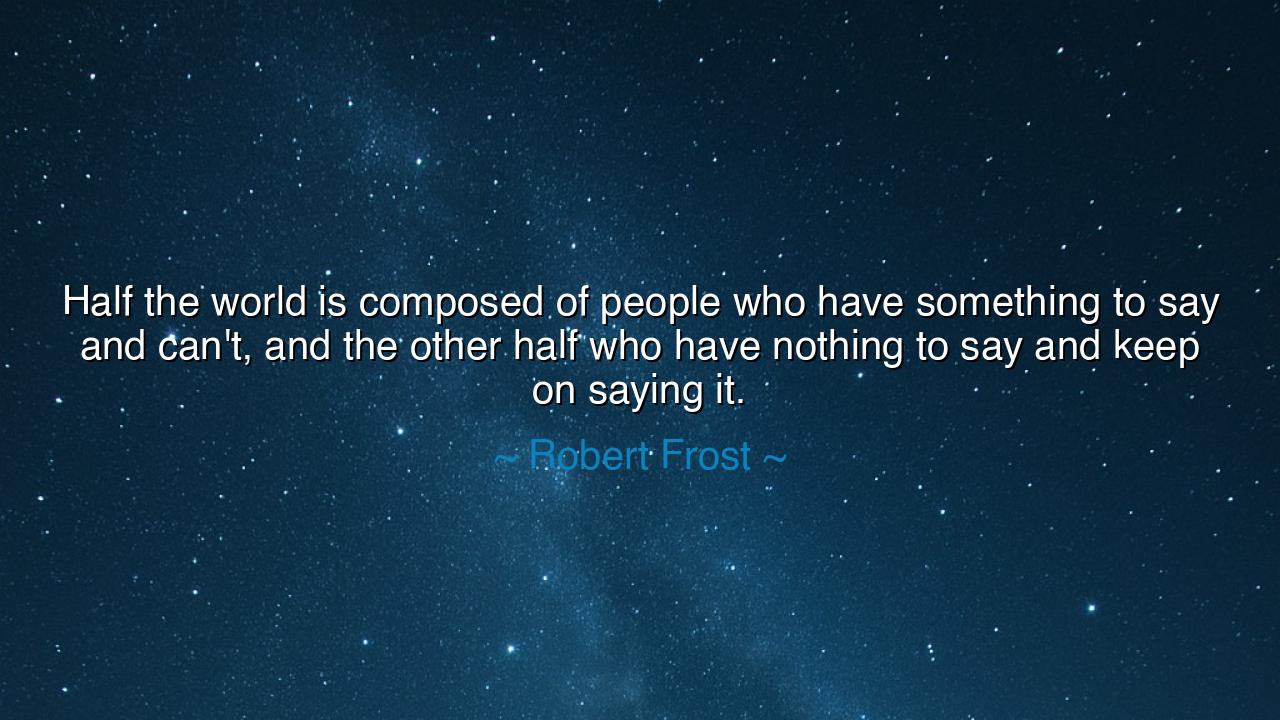
Half the world is composed of people who have something to say
Half the world is composed of people who have something to say and can't, and the other half who have nothing to say and keep on saying it.






Host: The room was dim, lit only by the glow of a single desk lamp and the orange tip of a cigarette. Outside, the city murmured—traffic, sirens, laughter, the endless hum of voices trying to matter. The rain had just begun, soft, hesitant, tapping against the window like a poet searching for words.
Host: Jack sat at his typewriter, his fingers hovering, the paper blank but breathing. Jeeny leaned against the bookshelf, her arms crossed, her eyes watching him the way one watches a storm about to break.
Host: Between them, on the table, lay a scrap of paper, scrawled with a quote that had become both challenge and mirror:
“Half the world is composed of people who have something to say and can’t, and the other half who have nothing to say and keep on saying it.” — Robert Frost.
Jack: “You know,” he murmured, exhaling, the smoke curling like a thought escaping, “Frost wasn’t just talking about talkers and thinkers. He was damning all of us. The silence of the wise and the noise of the empty—that’s the world in a sentence.”
Jeeny: “Or maybe he was grieving it,” she said, her voice low, gentle, but pierced with fire. “Because truth isn’t always silence or speech, Jack. It’s the moment in between—the hesitation, the breath before the voice breaks.”
Host: The lamp light flickered, illuminating the dust between them like tiny souls trying to speak. Jack leaned back, his chair creaking, his gray eyes half lost in shadow.
Jack: “You ever notice,” he said, “how the loudest ones always find the microphones, and the quietest ones are always buried in the crowd? Maybe the world doesn’t deserve what the silent have to say.”
Jeeny: “No,” she answered, stepping forward, “the world doesn’t listen because it’s afraid. Truth, when it’s spoken by the right person, changes everything. And change—real change—scares people more than lies ever could.”
Host: The rain intensified, rattling the glass, drowning out the city’s pulse for a moment. The room filled with the sound of it—a thousand drops, each a sentence that would never be finished.
Jack: “So what do we do, then?” he asked. “The ones who can’t speak, the ones who won’t shut up—how do you find the balance?”
Jeeny: “By earning your voice,” she replied, her gaze steady. “Not talking to hear yourself, but speaking because you must. Because the silence is heavier than the risk.”
Host: Jack paused, the cigarette now just a thread of smoke. His hand hovered over the typewriter, his fingers trembling slightly. He looked at her—not like a man debating, but like one remembering.
Jack: “You ever wonder why people fear saying what they feel?”
Jeeny: “Because honesty is nakedness, Jack. And we live in a world that loves masks. It’s easier to scream about nothing than to whisper something real.”
Host: The lamp flickered again, casting their shadows across the wall, stretching, intertwining, alive. The typewriter keys waited, silent, like teeth waiting for a bite.
Jack: “You think we’ve always been like this? All noise, no meaning?”
Jeeny: “Always. But the difference now is the volume. Everyone’s got a platform, but no one has a purpose. We’ve confused attention with significance.”
Host: Jack smirked, a sad, knowing curve of the lips.
Jack: “So, Frost was a prophet. He saw what we’d become—a civilization of voices that echo, but never reach.”
Jeeny: “And still,” she said, her tone softening, “somewhere, there’s always one person who’s afraid to speak, but who holds the sentence that could change everything. That’s what he was mourning—the silenced hearts, not the loud mouths.”
Host: The clock ticked, slow, steady, like a heartbeat refusing to die. Jack tapped a key—once, twice. The sound was small, but it cut through the room like the beginning of a confession.
Jack: “You ever think that’s why we write, Jeeny? Because we can’t shout loud enough?”
Jeeny: “No,” she smiled, sadly, “because we listen too much. Because we notice what others ignore, and we need a place to put it all. Writing isn’t speaking—it’s translating the unsaid.”
Host: Outside, the rain softened into a whisper, like the world had leaned in to hear them. Jack’s fingers moved now, slow, steady, the clicks of the typewriter forming a rhythm—the music of a voice learning to trust itself.
Jeeny watched, the light from the lamp spilling across his hands, illuminating the ink stains, the lines, the effort.
Jeeny: “See? There it is. You’re one of the half, Jack—the ones who have something to say, and finally found the courage to say it.”
Jack: “And what about the other half?”
Jeeny: “They’ll keep talking. They always do. But that’s okay. The noise is how we recognize the truth when it finally arrives.”
Host: The rain stopped, and the world seemed to hold its breath. The paper in the typewriter was no longer blank—its first line glowed in the lamplight, a sentence that had waited too long to be born.
Host: Jack smiled, faintly, as if he’d just remembered what it felt like to believe in words again. Jeeny sat across from him, her eyes shining with quiet triumph.
Host: And as the camera pulled back, the room faded into the city lights, the hum of the world returning—but this time, softer, almost respectful, as though it had heard something real at last.
Host: In that moment, Robert Frost’s truth was no longer cynicism, but invitation—a challenge whispered across time:
“If you have something to say, say it before the noise forgets how to listen.”






AAdministratorAdministrator
Welcome, honored guests. Please leave a comment, we will respond soon